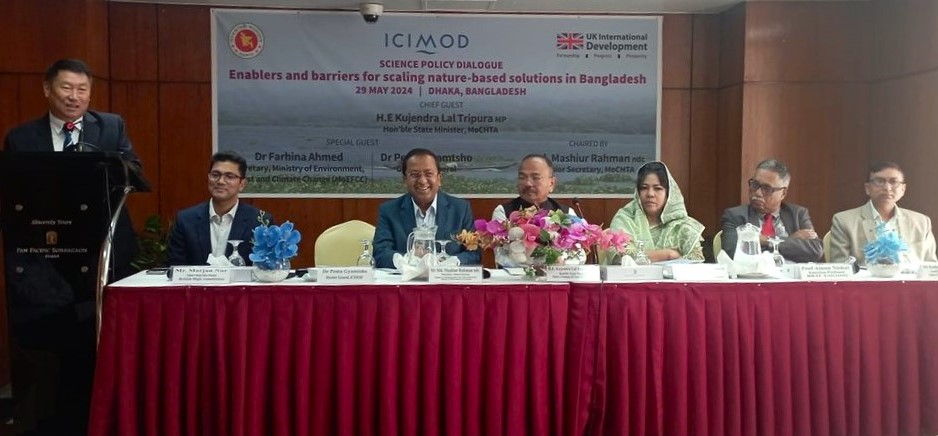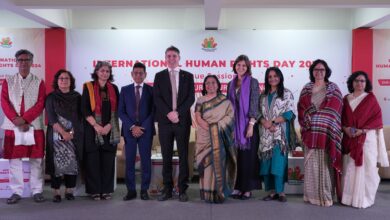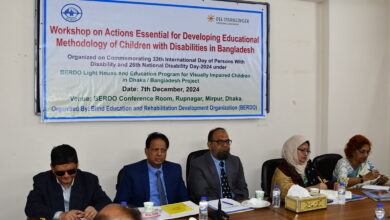Nature-based solution is critical to climate change adaptation in Bangladesh
Science policy dialogue of ICIMOD and Govt. of Bangladesh

PARVEZ BABUL
Bangladesh is one of the most climate vulnerable countries that face floods, cyclones, droughts and other human-induced and natural disasters every year. Those disasters have serious impacts and implications to biodiversity and human population. Nature-based solution (Nbs) concept is gaining momentum in Bangladesh and globally to climate change adaptation and mitigation. In line with that as a tool to provide solutions for emerging challenges through a broad range of actions nature is being promoted.
Dr. Pema Gyamtsho, director general of International Centre for Integrated Mountain Development (ICIMOD) said in his welcome speech, “We stand at a crucial juncture where the interdependence between humans and nature has never been more evident. The need for balancing humanities consumption with nature’s abilities supply has become most urgent than ever. Since our earliest days, we have relied on nature-based solutions to sustain our way of life. These time-honored practices are not new, and we need not reinvent the wheel to incorporate them into our modern world.”
ICIMOD is a Nepal-based, unique intergovernmental institution leading the global effort to protect the pulse of the planet – the Hindu Kush Himalya (HKH) – and the people, resources and culture that define it. Dr. Pema further said, “The current global landscape, marked by relentless economic and industrial growth. And unsustainable natural resource management, a mounting climate crisis, and pervasive pollution, demands that we urgently prioritize and promote nature-based solutions.”
The ministry of the Chittagong Hill Tracts Affairs (MoCHTA) of the government of Bangladesh, and the ICIMOD jointly organized the event at a hotel in Dhaka today, titled: “Science policy dialogue on enablers and barriers for scaling nature-based solutions in Bangladesh.”
The objectives were to facilitate shared understanding of science policy for implementing nature-based solution (Nbs) in Bangladesh; Share the context of Nbs and their relevance for the country; Identify key national policies and plans and research needs that will enable and reinforce the scaling of Nbs; Discuss enablers and barriers to scaling Nbs in the Chittagong Hill Tracts (CHT).
NATURE-BASED SOLUTION AND THE CHITTAGONG HILL TRACTS
Md. Mashiur Rahman ndc, senior secretary to the ministry of the Chittagong Hill Tracts Affairs (MoCHTA) said, “We are here to discuss how we can use nature to help the CHT. Bangladesh has grown a lot, but some places like the CHT, needs extra help. The CHT is a special place with beautiful nature and different groups of people are living there. The government is trying to do a lot of good work for the development of the CHT and to ensure it’s environmental quality. Still, some new issues are rising. For example, water scarcity. And it hurts the people of the CHT and the nearby. We can restore this by using what nature already does well. These natural ways are to make the land healthy, get more water, and help people live better. It is like working with nature, not against it. We, (Bangladesh) are the less emitter, but unfortunately, we are the worst sufferers due to climate change!”
The discussants hoped that the recommendations of the policy dialogue will aim to bridge the gaps in science, policy and practice. And strengthen their interface, especially in scaling Nbs for water security in the CHT region. Through facilitating the dialogue between experts, scientists, and policymakers from relevant government institutions, academia and think tank, both ICIMOD and the govt. of Bangladesh delved into gaps in science and policy. That was concerning Nbs converging to the policy actions to support scaling of Nbs in the CHT.
Experts highlighted that the projects cannot be implemented alone, scientists and the policy makers need to work together. Sharing of knowledge and experiences is required for perfect plans to use science.
H. E. Kujendra Lal Tripura, MP, State Minister of MoCHTA was the chief guest at the event. He said, “Today’s discussion is a valuable opportunity to share experiences and knowledge for the sustainable development of Bangladesh including the CHT region. Majority population of the CHT relies on agriculture as their major source of livelihoods. As the hilly region’s water sources deplete, so it is urgent that we embrace new, sustainable approaches to water resources. We look forward to identifying other promising ecosystem-based approaches that will help local communities adapt to a changing climate while bringing nature back. Use increased use of GIS and Nbs through adaptation to protect landscape of hills and mountains.”
The CHT is the most deeply forested zone, comprises 43 percent of entire country’s tree cover. As temperatures rise, communities and nature are vulnerable to increased extreme weather include heavy rainfall, landslides, droughts, and flashfloods. NbS are tools and approaches that protect, restore, sustainable use and manage natural resources. Also ecosystems in ways that address social, economic and environmental challenges that benefit people and biodiversity.
Farhina Ahmed, Secretary, Ministry of Environment, Forest and Climate Change, as the special guest, said, “Bangladesh is a leader in HKH region on climate change adaptation. This country is a basin of Bay of Bengal. Geographically we are one of the most vulnerable countries due to worst impacts of climate change. We have been facing global warming, sea level rise, carbon emission unnecessarily though we are not responsible for climate change. So, together we all should work more to use the Nbs tools to protect the environment. We need to make an inventory of tools and policies to validate and aline with scientific knowledge. Clear understanding among all the stakeholders to fulfill our commitments is important. We need to be very innovative for framework partnership. Nbs is a priority in the national adaptation plan of Bangladesh. This is the high time that all the stakeholders come forward, act, and implement the projects accordingly.”
COMMUNITY INVOLVEMENT
Experts gave emphasize on local community involvement for Nbs. Traditional and indigenous knowledge, and to involve representatives of the local government are important. And to ensure women’s equal participation in decision-making and project implementation. From local to national, national to regional and regional to global cooperation must be there. Adequate Financing. Integration and proper cooperation between government, NGOs, Civil Society organizations, activists and the stakeholders, among others are essential components.
Dr. Ainun Nishat, professor emeritus, BRAC University, as the the key note speaker said, “The local CHT people understand that the scarcity of water and food insecurity are their main problems, because climate change is changing the total hydrological cycle and the nature of weather. Ecosystem-based adaptation and nature-based solutions are very important. Bangladesh should focus on adaptation as it has excellent policy documents. Multiple varieties of trees in the country’s hilly region can help regenerate environment, forest and biodiversity. Climate change is a reality now, no longer a science fiction. So we need to form local level action plans specially focusing on the CHT aiming to cope with adverse impacts of climate change. The weather is becoming more unpredictable, warning that ‘more bad days are coming’.”
The scientists pointed out that capacity building, tourism development, enforcement of environment protection laws are truly important. Many methods are there but not being implemented.
Bir Bahadur U Shwe Sing, MP, chairman of standing committee on MOCHTA, said, “We cannot live without nature. Traditional knowledge, monitoring and evaluation, extended cooperation among all the organizations are very important. Inclusive policy, education and awareness are helpful to implement nature-based solution.”
Discussants added that gender, minorities and ethnic community issues must be addressed. Interdisciplinary approaches are important. Protect watershed, because people need water round the year. Scale up community-based actions.
WOMEN AND NATURE
Sharmin Islam, gender team leader of UNDP, on gender perspectives said, “Ensure mainstream gender and social inclusion in the CHT. Nbs should have the issues about different gender needs, inclusion, and right-based perception. Women and nature are closed, and women are the key to food security. But women are negatively impacted and more food insecure. So women’s leadership is important. Women’s inclusion in any sector and project– gets the result higher. Inclusive partnership need to develop too. Knowledge gap exists, so we should address the cross-cutting issues.”
During the roundtable discussion, the discussants stressed on the inclusion of vulnerable groups, women, community participation with traditional and indigenous knowledge.
Marjan Nur, climate change policy manager, British High Commission, Dhaka, said, “NbS are essential for addressing climate change and promoting sustainable development. To fully realise these benefits, Nbs should be integrated into mainstream policies and practices. However, it is also important to carefully consider and evaluate both the short-term and long-term trade-offs associated with these solutions.”
The policy dialogue focused on understanding the national policies and gaps in the implementation and scaling up NbS in the CHT region. Put the policies in to practice that need more research, experts observed.
While contacted, Kabir Uddin, GIS and Remote Sensing Specialist, and Bangladesh focal person at ICIMOD said, “Nature-based solutions are one of the most effective strategies to reverse degradation, adaptation and mitigation climate impacts. These solutions can help address various environmental, social, and economic challenges sustainably and cost-effectively. Seasonal water stress is increasing in the three CHT districts. Restoring springsheds is important to rejuvenate springs, water channels and improve water security.”
ICIMOD AND HKH REGION
ICIMOD remains committed to the challenging and ambitious task of driving policy and practice changes towards greener, more inclusive, and climate-resilient development in the HKH region.
“In the Hindu Kush Himalaya region, a business –as- usual approach threatens rapid glacial melt, increased frequency of disasters like floods. And the resulting impacts on biodiversity, livelihoods, unique cultures, traditions, and communities. Bangladesh stands out as a global leader in implementing innovative and effective Nbs strategies such as mangrove restoration, rejuvenation of common village forests, transitioning to cleaner energy technologies. Those are turning environmental challenges into opportunities. A great example is the floating agricultural system that we saw last year on a field trip to Goapalganj district,” Dr. Pema Gyamtsho mentioned.
Policy reach in South Asia, but action is poor, and we are poor in learning. We need more investment in climate financing, capacity development should be included at the table of discussions, the experts narrated.
Prodip Kumar Mohottam, ndc, national project director , MoCHTA; Shaikh Muhammad Mehedi Ahsan, country representative, IUCN; Dr. Golam Rasul, professor and chair, Dept. of economics, CAAS spoke at the event among others.
“Achieving our ‘climate-resilient’ goals requires not only these policy and practice solutions. Also we need sustained commitment to collaboration, innovation, and shared learning among governments, civil society, academia, communities and development partners,” Dr. Pema concludes.
Dr. Bandana Shakya, Action Area Coordinator, Nature-based solution Lead of ICIMOD moderated the event.





